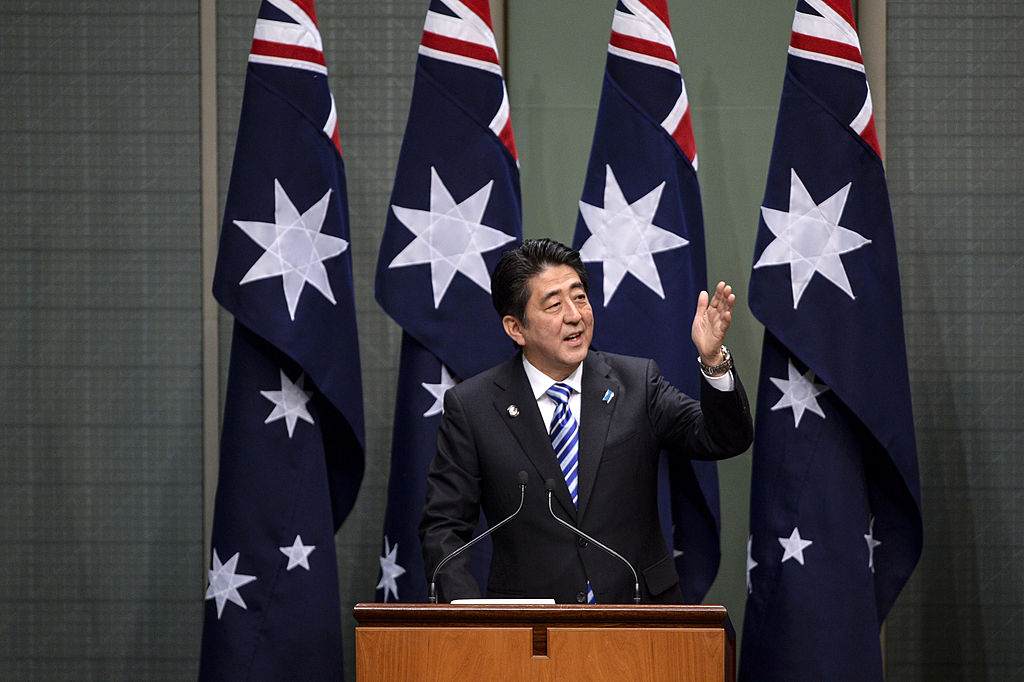 Print This Post
Print This Post- The Strategist - https://www.aspistrategist.org.au -
Abe changed Japan’s meaning for Australia
Posted By Graeme Dobell on July 11, 2022 @ 12:15

Let us join together all the more in order to make the vast seas from the Pacific Ocean to the Indian Ocean, and those skies, open and free. In everything we say and do, we must follow the law and never fall back onto force or coercion. When there are disputes, we must always use peaceful means to find solutions. These are natural rules. I believe strongly that when Japan and Australia, sharing common values, join hands, these natural rules will become the norm for the seas of prosperity, that stretch from the Pacific Ocean to the Indian. Today is the day our special relationship is born.
Japan has lost a true patriot and a true leader, and Australia has lost a true friend. The friendship that Mr Abe offered Australia was warm in sentiment and profound in consequence.
During his time as Prime Minister, no one was more committed to furthering relations between our two nations. He visited Australia no less than five times as the Prime Minister of Japan …
He elevated our bilateral relationship to a special strategic partnership. Under his longstanding advocacy for closer links between our two nations, we have also increased defence cooperation, including through the recently signed reciprocal access agreement.
Mr Abe understood instinctively the values that Australia and Japan share of democracy and human rights, and the shared interests we have in bolstering the global rules-based order. His vision transcended political cycles.
Article printed from The Strategist: https://www.aspistrategist.org.au
URL to article: https://www.aspistrategist.org.au/abe-changed-japans-meaning-for-australia/
[1] quasi-allies: https://www.aspistrategist.org.au/why-australia-matters-more-than-ever-for-japan/
[2] quiet revolution: https://archive.lowyinstitute.org/publications/2005-lowy-lecture-hon-john-howard-mp-prime-minister-australia
[3] transformed: https://www.aspistrategist.org.au/how-abe-changed-japan/
[4] seven long years: https://pmtranscripts.pmc.gov.au/release/transcript-23628
[5] address: https://parlinfo.aph.gov.au/parlInfo/search/display/display.w3p;db=CHAMBER;id=chamber%2Fhansardr%2F3060e0ca-b9e8-4414-bc3b-1c7e6d66cbd6%2F0004;query=Id%3A%22chamber%2Fhansardr%2F3060e0ca-b9e8-4414-bc3b-1c7e6d66cbd6%2F0000%22
[6] special relationship: https://www.aspistrategist.org.au/australia-japan-and-the-future-of-strategic-relationships-in-asia/
[7] military and security role: https://www.aspistrategist.org.au/asian-security-doctrines-1-japan-steps-up/
[8] deepening: https://www.aspistrategist.org.au/the-case-for-japan-australia-defence-cooperation-guidelines/
[9] risen: https://www.aspistrategist.org.au/the-new-relationship-of-japan-and-australia/
[10] partner: https://www.aspistrategist.org.au/what-will-australia-do-with-japan/
[11] Des Ball: https://nautilus.org/apsnet/0632a-ball-html/#axzz2m7LbMjVG
[12] regional construct: https://www.aspistrategist.org.au/making-the-indo-pacific/
[13] Indo-Pacific: https://www.aspistrategist.org.au/coexistence-or-war-in-the-indo-pacific/
[14] free-trade agreement: https://www.dfat.gov.au/trade/agreements/in-force/jaepa/Pages/japan-australia-economic-partnership-agreement
[15] Trans-Pacific Partnership: https://www.dfat.gov.au/trade/agreements/in-force/cptpp/Pages/comprehensive-and-progressive-agreement-for-trans-pacific-partnership
[16] redraw the economic and strategic map: https://www.aspistrategist.org.au/rcep-will-redraw-the-economic-and-strategic-map-of-the-indo-pacific/
[17] ‘decoupling’ duel: https://www.aspistrategist.org.au/cultural-decoupling-from-china-will-hurt-the-us/
[18] Trump whisperer: https://www.japantimes.co.jp/opinion/2020/08/29/commentary/japan-commentary/shinzo-abe-japan-achievements/
[19] boasted: https://www.aspistrategist.org.au/turnbull-on-trump-dystopia-and-deals/
[20] strengthen: https://www.dfat.gov.au/news/news/Pages/australia-us-and-japan-announce-trilateral-partnership-for-infrastructure-investment-in-the-indo-pacific
[21] trilateral: https://www.aspistrategist.org.au/inserting-iron-in-the-idiom-on-the-east-china-sea/
[22] between: https://www.jstor.org/stable/24905071?seq=1
[23] submarine: https://www.aspistrategist.org.au/the-strange-submarine-saga-how-did-we-get-there/
[24] Option J: https://www.aspistrategist.org.au/option-j-would-you-like-strategic-benefits-with-that/
[25] strong: https://www.lowyinstitute.org/the-interpreter/australia-japan-abbott-uses-word
[26] ally’: https://www.smh.com.au/politics/federal/tony-abbott-refuses-to-back-down-over-china-comments-20131128-2ydw1.html
[27] jibed: https://www.aspistrategist.org.au/the-strange-submarine-saga-vital-yet-vexed/
[28] rebirth of the Quad: https://www.aspistrategist.org.au/aspis-decades-quad-1-0-and-quad-2-0/
[29] ‘democratic security diamond’: https://www.project-syndicate.org/onpoint/a-strategic-alliance-for-japan-and-india-by-shinzo-abe
[30] ‘transformative leader’: https://www.pm.gov.au/media/australia-india-united-states-joint-statement-mourning-former-prime-minister-shinzo-abe
[31] China’s: https://www.aspistrategist.org.au/turnbull-memoir-lays-out-australias-shift-on-china/
[32] bullying: https://www.aspistrategist.org.au/the-evolution-of-australias-china-challenge/
[33] Mao–Nixon bargain: https://www.aspistrategist.org.au/the-great-asia-bargain-fades-and-falls-away/
[34] tribute: https://www.pm.gov.au/media/transcript-press-conference